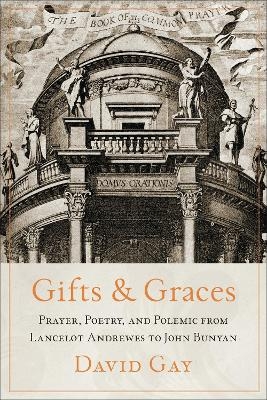
Gifts and Graces
Prayer, Poetry, and Polemic from Lancelot Andrewes to John Bunyan
Seiten
2021
University of Toronto Press (Verlag)
978-1-4875-0528-8 (ISBN)
University of Toronto Press (Verlag)
978-1-4875-0528-8 (ISBN)
- Lieferbar (Termin unbekannt)
- Versandkostenfrei
- Auch auf Rechnung
- Artikel merken
This book explores early modern debates over prayer and liturgy from Anglican and Puritan perspectives, highlighting the poetic representation of prayer on both sides of the controversy.
Prayer divided seventeenth-century England. Anglican Conformists such as Lancelot Andrewes and Jeremy Taylor upheld set forms of prayer in the Book of Common Prayer, a book designed to unite the nation in worship. Puritan Reformers and Dissenters such as John Milton and John Bunyan rejected the prayer book and advocated for extemporaneous or free prayer. In 1645, the mainly Puritan Long Parliament proscribed the Book of Common Prayer and dismantled the Anglican Church in the midst of civil war. This led Anglican poets and liturgists to defend their tradition with energy and erudition in print. In 1662, with monarchy restored, the mainly Anglican Cavalier Parliament reinstated the Church and its prayer book to impose religious uniformity. This galvanized English Nonconformity and Dissent and gave rise to a vibrant literary counter-tradition.
Addressing this fascinating history, David Gay examines competing claims to spiritual gifts and graces in polemical texts and their influence on prayer and poetry. Amid the contention of differing voices, the disputed connection of poetry and prayer, imagination and religion, emerges as a central tension in early modern literature and culture.
Prayer divided seventeenth-century England. Anglican Conformists such as Lancelot Andrewes and Jeremy Taylor upheld set forms of prayer in the Book of Common Prayer, a book designed to unite the nation in worship. Puritan Reformers and Dissenters such as John Milton and John Bunyan rejected the prayer book and advocated for extemporaneous or free prayer. In 1645, the mainly Puritan Long Parliament proscribed the Book of Common Prayer and dismantled the Anglican Church in the midst of civil war. This led Anglican poets and liturgists to defend their tradition with energy and erudition in print. In 1662, with monarchy restored, the mainly Anglican Cavalier Parliament reinstated the Church and its prayer book to impose religious uniformity. This galvanized English Nonconformity and Dissent and gave rise to a vibrant literary counter-tradition.
Addressing this fascinating history, David Gay examines competing claims to spiritual gifts and graces in polemical texts and their influence on prayer and poetry. Amid the contention of differing voices, the disputed connection of poetry and prayer, imagination and religion, emerges as a central tension in early modern literature and culture.
David Gay is a professor in the Department of English at the University of Alberta.
Introduction
1. Lancelot Andrewes and George Herbert: Where Most Pray
2. Jeremy Taylor: The Blessing of Unity
3. John Milton: The True Model
4. John Bunyan: The Nameless Instrument
Afterword
Bibliography
| Erscheinungsdatum | 27.05.2021 |
|---|---|
| Zusatzinfo | 8 b&w illustrations |
| Verlagsort | Toronto |
| Sprache | englisch |
| Maße | 159 x 235 mm |
| Gewicht | 450 g |
| Themenwelt | Geschichte ► Allgemeine Geschichte ► Neuzeit (bis 1918) |
| Geschichte ► Teilgebiete der Geschichte ► Religionsgeschichte | |
| Geisteswissenschaften ► Sprach- / Literaturwissenschaft ► Anglistik / Amerikanistik | |
| Geisteswissenschaften ► Sprach- / Literaturwissenschaft ► Literaturwissenschaft | |
| ISBN-10 | 1-4875-0528-0 / 1487505280 |
| ISBN-13 | 978-1-4875-0528-8 / 9781487505288 |
| Zustand | Neuware |
| Informationen gemäß Produktsicherheitsverordnung (GPSR) | |
| Haben Sie eine Frage zum Produkt? |
Mehr entdecken
aus dem Bereich
aus dem Bereich
Giordano Bruno - ein ketzerisches Leben
Buch | Hardcover (2024)
C.H.Beck (Verlag)
CHF 41,85
das dramatische 16. Jahrhundert
Buch | Hardcover (2024)
Rowohlt Berlin (Verlag)
CHF 47,60


